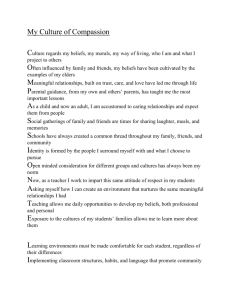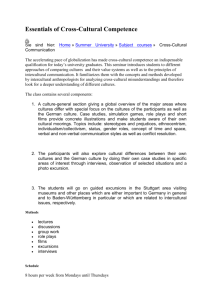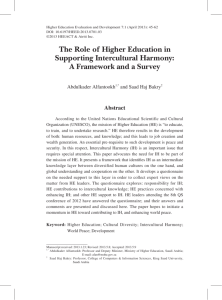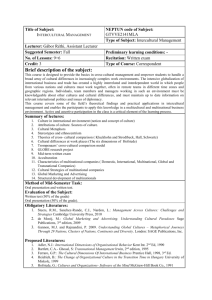STUDENTS* LANGUAGE PORTFOLIO
advertisement
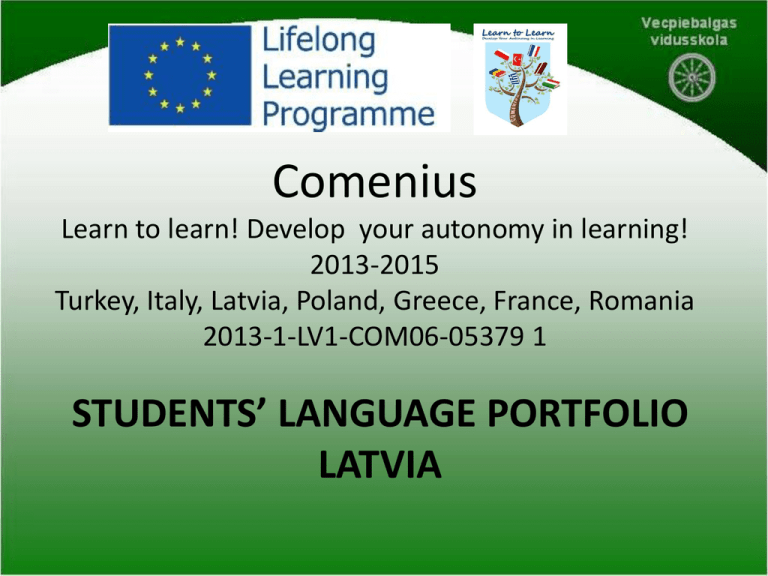
Comenius Learn to learn! Develop your autonomy in learning! 2013-2015 Turkey, Italy, Latvia, Poland, Greece, France, Romania 2013-1-LV1-COM06-05379 1 STUDENTS’ LANGUAGE PORTFOLIO LATVIA Questionnaire AUTONOMY IN LEARNING (Elīza Oša) 1.Do you like learning?- more yes than no 2.You learn more - during lessons in class 3.When does the learning process end?- it never ends 4.Explain in your own words what “autonomy in learning” means. Autonomy in learning is when you learn by yourself, on your own Questionnaire 5.What is the purpose of autonomy in learning? To reach target in your own way, by yourself. 6. Are you an autonomous learner? more yes than no 7. Which subject is better for autonomous learning? Why? I think all subjects , because you don’t know what you will need in future. Easier to learn autonomously is to learn languages. Questionnaire 8. Which of the following things should you do in order to have autonomy in learning? all of them (set personal goals, find methods and strategies to reach the objectives, find resources to help you, evaluate the results) 9. Which learning strategies in class would improve your ability to learn autonomously? group work Questionnaire • 10. Who/ what can provide the information and knowledge you need ?-teachers, internet • 11.a List advantages. You can learn whatever and however you want. You become more selfconfident, more independent and smarter. You can faster find your way to live your life and do everything to reach your goals. Everything better stays in your brain if you enjoy learning by doing it in your own way. Questionnaire 11.b List disadvantages of learning autonomously. You need strong character to order yourself to learn(no one checks your work) . It can be hard to find the best way for learning by yourself. Actually, there aren’t a lot of disadvantages, because it’s the best way of learning. 12. Autonomous learning has an individual dimension and a social dimension Questionnaire 13. For a contemporary European citizen the ability of learning by himself/herself, of being an autonomous learner is important 15. How will you continue your learning process after you graduate college/ university? • I will learn from people met in my life • I will read educational literature • I will learn from life by doing things Questionnaire 14. What kind of changes can be seen in the life of an autonomous learner? What are the differences between autonomous learners and others? Difference is in ability to be independent. Autonomous learner tries to find more ways to get things done. Usually autonomous learners are sociable, talkative. They know how to plan their time. Unlike others, autonomous learners are doing everything for themselves, not because someone ordered them to do. They see their peak and are ready to give and do everything to reach it, and they will do it in their own way. RESULT OF THE QUESTIONNAIRE Am I an independent learner ? Yes, I’m. I like to learn things in my own way. I better choose learning things I like and things I will need in my future, not things others want me to learn. I often ignore advices about learning, but I really want to find my own way. When I do something, I give my best for reaching as good result as it’s possible. RESULT OF THE QUESTIONNAIRE Motivation Why do I need to have autonomy in learning in the contemporary society? Nowadays usually a person is alone in his/her working life(I feel that). So I must be ready for it. I need to be creative, active and imaginative, because the world needs independent personalities, not subordinate workers. Reed books in English. WHAT DO I NEED TO DO TO LEARN ENGLISH BY MYSELF MY LANGUAGE BACKGROUND (Sintija Igaune) Mother tongue: Latvian I've learned the language through (tick all that apply) using it with members of my family using it in the community formal education (e.g. language classes at school or work) travel friendships/social contacts X X X working life newspapers, magazines, books cinema, TV, radio X X I am good at I need to work harder to improve my grammar skills in English. I want to learn language for ability to speak to others that don’t understand my language. I want to watch movies in other languages and read books, listen to music. And for travelling and maybe someday for studying abroad and my future job. explaining my thoughts and asking for things that I need or just making a conversation. When I learn a language… • I enjoy reading and prefer to see the words I am learning. I like to learn by looking at pictures and flashcards. This method helps me because sometimes if a word is difficult, seeing it on a paper makes me remember it quicker. When I learn a language… • I prefer to learn by listening. I enjoy conversations and the chance for interactions with others. Hearing how the language is pronounced helps a lot for remembering and studying. It’s also can be a fun experience When I learn a language… • I prefer an interactive approach to learning a new language, to ‘take risks’ when communicating and learn from my mistakes. Sometimes just taking the risk and trying to speak is better, because then you can get to know your mistakes quicker and learn from them. When I learn a language… • I prefer learning a language to convey an idea, rather than worry about whether I have used language rules and structures correctly. This way I can enjoy more conversations and fell free. CONTACTS (Jēkabs Zommers) My family background My intercultural background: factors that may have influenced how I respond to intercultural situations.. • We are Latvians. But family friends live in Sweden, so I have experience to live together with them for a short time. Travel to other countries for holiday: I have travelled to Germany with folk dance collective, visited family friends in Sweden, took part in Baltic sea project in Finland, travelled with family to Estonia, Lithuania. I have attended chello concert in Norway. NowRomania. Time spent living abroad One week in Finland 5 days in Germany 3 days in Sweden Short tem visits How I see myself in intercultural contexts... A. Encounters with different cultures in my own country Eating and drinking in other cultural contexts, e.g. mealtime procedures, menus etc. 1 2 3 4 X Encountering the different values of people from other cultures, e.g. rules, beliefs etc. X Encountering the different behaviour of people from other cultures, e.g. ways of greeting one another, courtesies, expression of feelings etc X Communicating with people of different cultures, e.g. coping with their spoken language, facial expressions, hand gestures, body language etc. X Communicating with people of different cultures, e.g. coping with misunderstandings, a different sense of humour etc. 5 X How I see myself in intercultural contexts... B. Encounters with people of different cultures in their own countries or communities Coping with the customs of host countries or communities, e.g. rules and courtesies that local people observe and may expect me to observe. 1 2 3 4 X Adapting to the rhythm of life in other cultures, e.g. getting used to different mealtimes etc. Integrating with the customs or behaviour of host countries, e.g. beginning to use forms of greeting that are very different from my own. 5 X X How I see myself in intercultural contexts... C. Encounters with different cultures in the workplace Clarifying areas of uncertainty about work arrangements, e.g. describing what I am used to and asking what happens in the other culture. Adapting to other work practices, e.g. using unfamiliar procedures to complete a work task. Coping with different formalities, e.g. learning new ways of showing respect to senior colleagues from other cultures. Relating to colleagues from other cultures, e.g. learning what they like to talk about during work breaks. Being aware of issues arising within a different cultural group, e.g. learning what topics seem to be avoided and what the group’s views are likely to be about a current political situation. Building bridges between colleagues of my own culture and those of a different culture, e.g. sensing that someone of my culture has said the wrong thing and explaining the misunderstanding to both sides. 1 2 3 4 5 X X X X X X ENGLISH SKILLS (Mārtiņš Arājs) Reading 10 9 8 7 6 5 4 3 2 1 0 My reading skills are at high level and that is not only because of English lessons but also because I read books in English and comunication (reading included) on internet is also in English some times. Writing 12 10 8 6 4 2 0 Writing is not the thing that I like the most but my skills at writing are good. Of course high level writing skills are needed in future for job or University so it is important to upgrade them and learn more by myself. Listening 12 10 8 6 4 2 0 I have very good listening skills, of course, I could do more in future. I think I have good listening skills because I attend music school. And that helps me a lot. Speaking 19.5 19 18.5 18 17.5 17 16.5 16 15.5 15 14.5 My speaking skills aree good because I participate in debating, not only in Latvian but in English too, and that is very useful for speaking. Conclusions (taken from theComenius team members’ portfolios ) • I think the biggest problem for me is scariness of saying something wrong. But slowly I am getting more confident( Diāna Tunte) • We just don’t have a choice, we must speak to each other. I like that, because it helps me (Jēkabs Zommers) • I have found out the best learning ways for me – listening and speaking (Maira Asare). Conclusions • I haven’t learnt rules and grammar enough so now they are my biggest enemies (Diāna Tunte). • Self-evaluation test showed me English skills that I need to improve. I’m not fully great in grammar and very complex texts(Sintija Igaune). Conclusions • I had never done self – evaluation about autonomous learning and my skills in English It helped me a lot (Jēkabs Brauers). • Self-evaluation is definitely the most difficult type of criticism to receive(Mārtiņš Arājs). • After self-evaluation test I have come to conclusion that I must do much more for improving my language (Eīza Oša). Conclusions • This project gave me experience for English exams(Kristīne Kleinberga). • This project gave a different perspective on subjects such as: culture, politics, learning, selfdevelopment, economics, morals, traditions, travel, religion European Union (Kārlis Apalups). This project has been funded with support from the European Commission. This publication [communication] reflects the views only of the author, and the Commission cannot be held responsible for any use which may be made of the information contained therein THANK YOU!
